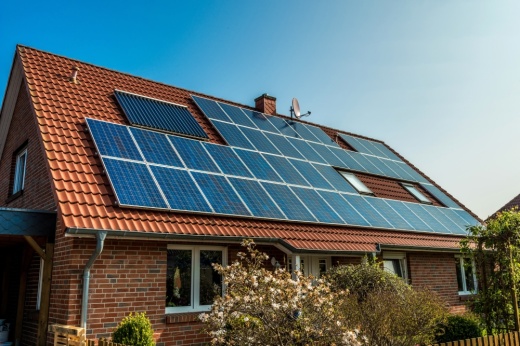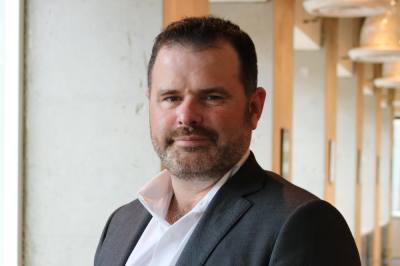Here are his tips for homeowners looking to make the switch to solar energy. Answers may have been edited for length and clarity.
What should someone be thinking about before they even make that first step in the process of getting solar panels?
It depends on the knowledge that you have about solar. So, really understanding what solar is and how it works. You want to make sure that you're dealing with people that are accredited with the Better Business Bureau, in terms of when somebody gets to your house.
The most important thing is understanding your usage and your offset. What that means more specifically is in order for solar to function the way that it's supposed to, you need to have as high of an offset as 100% or greater. The reason that you do that is because what you're attempting to do is eliminate your electric bill. The overall purpose of solar is to produce enough solar that you are not only satisfying the needs of your home, but that you're also able to sell some of it back to the grid. When you sell power back to the grid, [the government] gives you credits.
What are the requirements that someone needs on a home?
Every time it's accustomed to each person, so one of the biggest reasons that people can't get to 100% offset is because their usage is too much and they don't have the roof space to put enough [panels]. So as an example, you have a one-story house, and you have adequate room; you're using 15,000 kilowatt hours a year. But then you go around the corner, and the next person has a two-story house. They can have the same amount of usage, but you can't put enough panels on there to offset their usage because the panels are not getting enough sun throughout the entire day.
What do you see as the benefits of switching to solar?
For example, we used more power in the month of June. We set records in Texas. And we've not been told that we have to turn our power off because of [people switching to solar]. So, the benefits of going solar is that No. 1, the federal government gives you a 30% tax credit. The second is obviously the environmental impact. And the third thing is that with companies like us, there's no upfront cost. Everything is paid for up front, and then you just pay a ... much lower solar bill than their electric bill, then they do away with their electric bill. All you're doing is financing it for up to 25 years, so you will have the same solar array, it will never go higher. So while these costs continue to rise, your solar price will stay the same until you pay it off, and at that point you don’t have a solar bill or an electric bill.
What if I want to sell my home after getting solar panels installed?
The new buyer has two choices: They can hold the cost of the solar into the amount financed, or there is a one-page transfer document at the time of closing the account that transfers it to the new owner. So, they get the same price and the same rate that the current owner got.
How should people look to avoid bad actors in the industry? How can you kind of identify and steer away from those companies?
There’s three bad things about our business. No. 1, a lot of sales people will tell customers that if you go solar when the electricity goes off, your system still works. That's not true. You have to have electricity for solar to work. No. 2, they will intentionally show you a smaller system size than you need to make the price look better. In that particular case, you end up with an electric bill and a solar bill, and then you're really unhappy. No. 3 is the way that federal tax credit works. Some people will tell you the federal government is going to write you a check for 30% of your system costs, and that's not true either. You have to have taxes where you owe money, and you can use that instead of having to pay the government money.
I recommend that you get at least more than one quote; then you compare the quotes in terms of the number of panels that they're putting on your house versus the number of kilowatt hours you use. Then, always compare and make sure that the number of panels in the system service is the same as the other quote. And make sure that you get a production guarantee that says that if [the panels] don't produce what they're supposed to produce, they'll fix it for free. Most companies will not do that.
What are the maintenance requirements or any recurring work that needs to go into maintaining a system?
Find a company that will either charge you a little [for maintenance] or do it for free because basically what will happen is occasionally you'll have to get up on your roof and clean. So, make sure that that's included. otherwise you're just going to be stuck having to do that yourself.
What would you say to people whose main concern with getting solar panels installed is the aesthetics of it?
What we always try to do is put the panels on the back of the side of the house. As far as the aesthetics go, sometimes unfortunately we do run into that problem. Do you want to look at black-on-black panel or do you want to keep a $400 or $500 electric bill when you could have a $250 bill? It's a conversation that we have.
Anything else people should know?
A lot of companies will not install microinverters. You want to install a microinverter for every single panel because if one panel goes down and you have 20 panels, the others will still work. But the microinverters have a cost associated with them; they're somewhat expensive. If you don't have a microinverter and one panel goes down, they all go down like Christmas lights; your entire system will go down all the way on if you don't go with a company that will install a microinverter for every single panel.
Make sure you're doing business with somebody that's been around for a while that's accredited and that has the backing of somebody that is going to be able to support you, because we run into people all the time that have gone solar and they can’t get people on the phone to get anything served. They're just left stuck. That's obviously going to leave a bad taste in your mouth about the entire industry.






